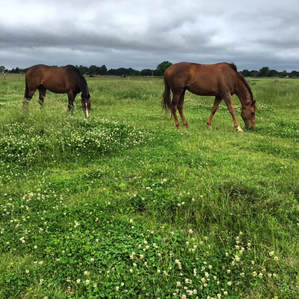 Good pasture management and is vital to providing a good grazing environment for horses Good pasture management and is vital to providing a good grazing environment for horses I've owned and boarded a lot of OTTBs and thoroughbreds at this point....If there's one thing I'm good at, it's putting weight on these "hard-keepers" and keeping them looking good even during the winter. Here are some things I've learned over the years: 1) Routine: All the horses have access to hay or pasture 24/7 and get fed grain twice a day. Our hay is baled off our own land or neighboring pastures, so the horses don't get a large variation in nutrition from hay shipment to hay shipment. For me, the benefits of feeding large roundtables in the winter, when there is little to no grass, significantly outweigh any negatives. Access to continuous forage is absolutely necessary to prevent ulcers (which 90% of OTTBs have at some point), helps alleviate boredom which causes bad habits, and also makes the horses less "starving" at feed time. When the weather is bad, I feed the roundtables liberally and clean up any bad hay they won't eat with the tractor. In my experience, a well-fed horse will not often eat plants or weeds they shouldn't. I don't try to force the horses to eat moldy, peed on, or weedy hay...even if that means some of it is wasted. Two or three smaller grain meals are significantly more digestible than a single large meal. Feeding twice a day also gives me the opportunity to check on every horse and make sure they have normal appetites and no other injuries. I always add water (warm water in winter) to all grain meals. This helps with digestion preventing choke, aids in keeping the horses hydrated, and also encourages them to eat any powdery supplements they might try to filter through. In the winter, I try to set up heated tanks or I go out and break the ice on frozen water troughs multiple times a day. I do whatever I can to encourage as much hydration as possible. Early detection is key! Feed changes should be made slowly, but I also try to match the horse's feed amount to how much work they are in. If I have a horse that is being hauled to horse shows 6+ hours away, two weekends in a row, he's probably going to lose some weight. That horse is going to need a little extra food the week prior to and post-competition. Likewise, if a boarder is going away on vacation and their horse is going to get 3 weeks off, they probably don't need as much feed. If I see a horse start to lose or gain a significant amount of weight, I immediately make adjustments. 2) Feed: My magic feed formula is Powell's Easy Choice + Rice Bran + Alfalfa. All the TBs on my farm get Powell's Easy Choice, a 14% Protein 6% Fat Feed. I like this feed because there aren't big fluctuations in formula, it's low in sugar/corn, and it's formulated to meet the vitamin/mineral requirements of horses in this region. I've had horses on other popular brands of feed such as Nutrena and Purina, and they did not look as good as the horses on Powell's. I had two horses come to me on other brands of feed this past summer and they had significantly worse coat bleaching and hoof quality issues than other horses, which are both symptoms of vitamin/mineral imbalances. For horses in hard work or those that don't gain or maintain enough on just the Powell's feed, I add in rice bran as a source of fat. Almost all TBs will need alfalfa (I like either chaffhaye real alfalfa hay), for at least part of the year. Alfalfa is a fiber source even picky eaters will enjoy, it adds protein, and it's high in calcium acting as a good stomach acid buffer. For this last reason, it's also great for horses prone to ulcer or other stomach issues (like most TBs). 3) Supplements/Vitamins/Minerals: Too many supplements are unnecessary and can even be harmful. Everyone should know the ingredients and nutrition levels present in each supplement they feed their horse and how all these work together and in combination with the rest of the horse's feed. I put all my personal horses on a hoof supplement like Farrier's Formula or SmartPak's SmartHoof, that is high in biotin, copper, and zinc. This area has high iron content which can cause dry coats and brittle hooves unless it is balanced with copper and zinc. For seriously hard keepers or those in hard work, I will often add a splash of vegetable oil for calories. When the weather is particularly hot or cold, I give all horses electrolytes or a little table salt to encourage drinking. 4) Exercise: Moderate exercise will often make a horse gain weight and look better. I've had a few horses that no matter how much you feed them always look "ribby." These horses often have little muscling or fat along their topline and have big "hay bellies" that seem to expand causing more ribbiness. An easy solution to this is moderate exercise! Just 2 days a week of light hacking/trail riding can make a HUGE difference for these horses. Most thoroughbreds want to work, and moderate exercise can also help encourage them to have a healthy appetite and stay focused on eating forage during the day. 5) Turnout, Shelter, Stalls, Flies, & Weather: We make an effort to keep the pastures mowed and free of an excessive amount of weeds and manure. Dragging the pastures in the summer is a good way to break up mature piles and allow them to decompose. I try to let each field rest for a minimum of a few weeks every year so the grass can recuperate. This also helps "heal" excessively muddy or worn down areas. A lot of horses will actually lose weight in the summer, even when the grass is plentiful. Why?...Flies! Many of my horses are very dramatic and will literally run away from them. I have one horse in particular who unless he has 24/7 access to a stall will stomp his shoes off, pace the fence, and loose hundreds of pounds. Fly spray, fly sheets, and adequate shelter can help with this. The heat during Arkansas summers can literally "sweat the pounds" off a horse. Some horses will have to spend the day or part of the day inside if they are going to maintain condition. For other horses, time in a stall causes anxiety and stress, no matter what the weather is. While it might seem "nice" to bring her in out of the bad weather, she will spend the entire time frantically running in circles, screaming for her buddies, and certainly not eating. These horses need to stay outside happy in the herd! We've all heard that horses will lose weight in the winter--but there's no reason for this. While some don't, many TBs, especially pasture kept ones, have to wear blankets. These horses have been kept in controlled mostly indoor environments for their entire lives as have their ancestors for hundreds of years. I blanket all clipped horses under 60 degrees and most unclipped horses if it's below 30, staying frozen during the day, or if it's below 50 and precipitating. If your horse is shivering, they are well past the point of needing a blanket! 6) Ulcers: OTTBs, horses in heavy training, and horses that are traveling, are all at a major risk of developing ulcers. Any horse I'm showing regularly gets Aloe Vera Juice added to their feed twice daily --it's cheap, is proven to help, and has no drawbacks! If I am going on a particularly long or stressful trip, I will give my horses 1/2-1 tube of ulcer guard on the day I leave and every day I am gone. Horses displaying major sings of ulcers often need a full 28-day course of omeprazole or ranitidine, but I usually leave this up to the discretion of my vet. In general, I try to create an environment for the horses that is as consistent, predictable, and low stress as possible. All these factors above also contribute to a very low rate of colic for horses on my farm! If you have any questions about my feeding program and routine, just ask! Send me an email anytime at [email protected].
0 Comments
Leave a Reply. |
Details
Christy ZweigAdventures eventing as a semi-pro in the mid-south. Archives
April 2024
Categories |
Proudly powered by Weebly

 RSS Feed
RSS Feed